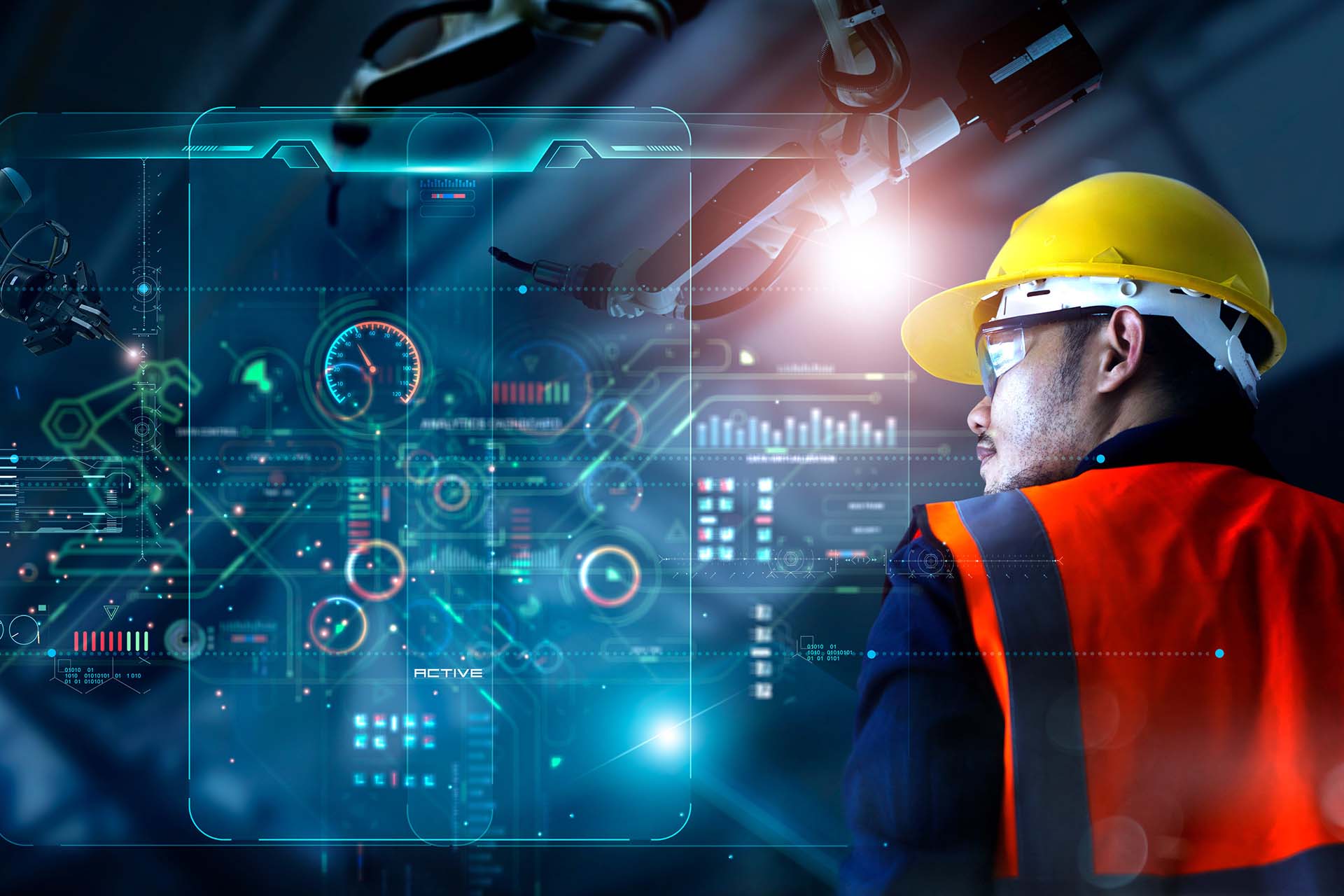
Artificial intelligence boosts industrial production in many ways. It supports decision-making and proactive maintenance and helps optimize processes. It also enables business development, and even completely new business models. In this blog post, we describe practical perspectives on how AI can be used to improve industrial production.
More impactful decision-making with data
One of the most significant benefits of AI in industrial production is its ability to support decision-making and help in focusing more on the future rather than the past. This development is based on the ability of AI to analyze large amounts of data, and provide predictions and recommendations based on the gathered information. For example, demand and material forecasts can be particularly useful in complex production processes where several variables and factors need to be considered.
Already today, many companies collect huge amounts of data in different systems, but some of this data remains unused due to a lack of appropriate processing. Because of its convenience and versatility, AI is a great way to make use of collected but unused data. It not only processes data, but also identifies patterns and trends that the human eye cannot discern. Artificial intelligence helps make use of data and optimize production through real-time monitoring, risk management, and forecasting.
Real-time monitoring and risk management
AI can be harnessed to monitor the production process in real time, identifying any anomalies or bottlenecks, and notifying production workers of them. This enables a quick response and avoids possible production stoppages. AI can also be used to identify potential security threats, helping react quickly to protect the business.
The strength of AI as a driver of production planning and manufacturing processes comes in particular from its ability to simultaneously bite into a large amount of diverse information, from sales history and demand trends to product structures and resourcing.
Using historical data to predict the future
AI can use machine learning to analyze historical production data, and identify which factors affect production performance. Once enough data is collected, AI helps the company make better decisions. For example, in inventory management, AI can help make inventory rotation more efficient, learn from and become more predictive of production planning, and help manage the allocation of resources according to demand, among other things. You can read more in our previous blog post on using machine learning for business forecasting.
Taking production planning and processes to a new level
Demand-forecasting models are used as a key basis for production planning, and AI can be harnessed to help. Based on forecasts, rough planning is made, followed by detailed planning that optimizes individual production slots – also taking into account the availability of raw materials, semi-finished products, and other necessary materials. AI already has a lot to offer in areas such as scheduling and optimized use of production slots, and this is an area where further progress is now being made at a rapid pace.
In production processes, AI can monitor the production line in real time, and make immediate adjustments to improve production efficiency. It can optimize the sequence of production steps, speed and optimal use of resources, among other things, allowing the plant to reap the benefits of waste minimization and energy savings.
The strength of AI as a driver of production planning and manufacturing processes comes in particular from its ability to simultaneously bite into a large amount of diverse information, from sales history and demand trends to product structures and resourcing. Based on this information, it can produce suggestions for improvements, including in the use of time and resources. More efficient production planning and optimized processes result in higher productivity, lower costs, and better quality in the big picture.
Read more: Fresh Servant is increasingly using machine-learning-based sales forecasts in its growing business
Artificial intelligence helps optimize preventive maintenance
Predictive maintenance is a process where the condition of equipment and machinery is constantly monitored, and maintenance is carried out proactively as required. Artificial intelligence can be harnessed into the process and collect data on equipment performance.
It can detect deviations from normal operation and warn you of the need for maintenance well in advance of a fault.
AI uses the data collected from the equipment to help plan the right predictive maintenance for each situation. It also helps optimize the storage of spare parts and ensure that they are available when you need them. This further improves the efficiency of predictive maintenance and helps reduce unexpected downtime.
Artificial intelligence to support business management
AI’s role in adding value and supporting business management is strongly linked to its ability to process large amounts of data at once, to identify trends, and thus to predict the future. It’s still no crystal ball, but prediction models are constantly evolving, and accuracy levels are improving rapidly.
For the organizations that use it, AI provides truly valuable, processed information about operations, and, at a larger scale, about the industry. With this information, it is easier to plan the direction and strategy of the business going forward. Some of the processed information may also be so valuable to other parties in the supply chain that entirely new types of information products, services and business models can be developed around it. Again, the frontrunners are already ahead of this game.
Artificial intelligence refers to the ability of a machine to use skills traditionally associated with human intelligence, such as reasoning, learning, planning, or creating. Artificial intelligence allows technical systems to observe their environment, process their observations, and solve problems to achieve a specific goal. AI systems can shape their behavior up to a certain point by working autonomously and analyzing the effects of past actions.
Machine learning is a branch of artificial intelligence where a machine learns from repeated events without being taught by a human. The aim is to make the software work better based on the underlying data and the potential user activity. In machine learning, the software does not necessarily have an algorithm for every situation, but the machine learns to reach the desired outcome autonomously.
Deep learning is a set of AI methods. Its aim is to create a neural network based on artificial neurons, using algorithms, that can solve the problems given to is. Deep learning is used in particular to solve problems where traditional problem-solving would require complex rules.
* Used sources include the European Parliament website, the Tietoviikko magazine, and Wikipedia.
Interested in learning more about the use of AI?
Artificial intelligence provides numerous opportunities to make production more efficient. It can support decision-making, optimize processes, support preventive maintenance, and open entirely new business opportunities.
Is your organization thinking about how to incorporate AI to support daily work, and how to get started? Contact Pinja’s experts and get the right development proposals for your current situation. The extra power of AI is not something to sit back and watch.
Read more:
AI and machine learning to boost supply chain efficiency and production, and save time for sustainable innovation
Machine learning significantly improves the accuracy of business forecasts
Fresh Servant is increasingly using machine-learning-based sales forecasts in its growing business
What you need to know in the manufacturing industry about the DevSecOps operating model Pick our four tips for your organization
Back to the Pinja Blog
Categories
- Career at Pinja (68)
- Manufacturing (46)
- Knowledge Management (45)
- Production Development (44)
- Software Partnership & Tools (42)
- Sustainability (37)
- Wood and Forestry (37)
- Bioenergy and Recycling (29)
- IT Support and Outsourcing (24)
- Ecommerce (23)
- Maintenance (22)
- Artificial Intelligence and Machine Learning (15)
- Public Services (9)
- Compliance (1)

